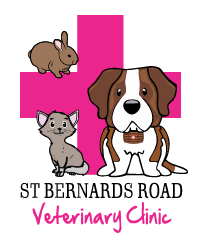Caring for your Pets
Cat Articles
Caring for your new Kitten
Environmental Enrichment for Cats
Feline Asthma
Feline Idiopathic Cystitis
Feline Immunodeficiency Virus
Food Puzzles for Cats
Happy Cat = Healthy Cat
Hyperthyroid Disease
Nursing care for your cat
Pain Medication for your Cat
Vaccinating your cat or kitten
Visiting the Vet with your Cat
Feline Immunodeficiency Virus
What is FIV?
Feline immunodeficiency virus (FIV infections) is a disease state that is often unrecognised and impacts silently on cats' health. It is a retrovirus that was first isolated in 1986 in a colony of cats in California that were exhibiting multiple chronic infections. FIV attacks the T-helper lymphocytes and its immunological progression has many parallels with Human Immunodeficiency Virus (HIV) infection. FIV is a significant cause of feline disease and may be associated with a range of clinical signs including lethargy, anorexia, weight loss, pyrexia, periodontitis and gingivitis, enteritis, lymphadenopathy, and respiratory, urinary tract and skin infections. Eventually FIV infected cats are affected by severe immunosuppression.
Transmission
Transmission occurs primarily through biting with large amounts of virus being present in the saliva of infected cats. Parenteral inoculation of cats with blood, plasma, or fluids from infected animals will also readily transmit the infection, highlighting the need for separate sterilised surgical packs and separate sterile needles for each feline patient.
Cats likely at Risk
The type of cat at highest risk of contracting FIV is an entire male adult that actively fights. The type of cat that is at the lowest risk of contracting FIV is a young female spayed cat that is isolated or has minimal contact with other cats.
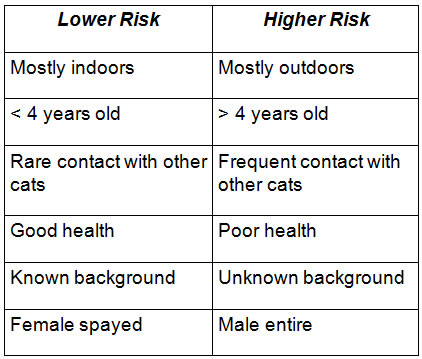
Clinicopathological Signs
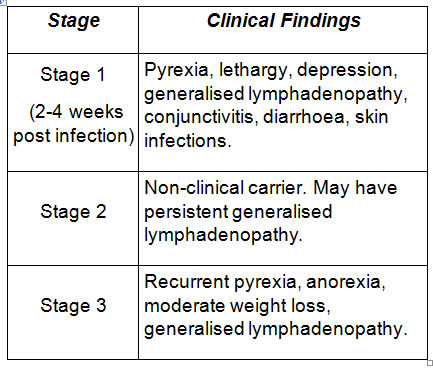
Any cat with a persistent pyrexia, particularly if associated with a cat fight abscess, may be infected with FIV. Other clinical signs may include lymphadenopathies, gastrointestinal signs such as diarrhoea, stomatitis and gingivitis, respiratory and urinary tract infections, and dermatopathies including otitis externa and abscesses. Renal disease, ocular lesions, and neurological signs can also be associated with FIV.
What do I do if my cat has FIV?
FIV infection appears to be lifelong and the clinical course of disease is slow. There is only a very low level of mild reactions.
Keep your cat indoors only: Now that you know that your cat has an infectious disease, the responsible thing is to prevent the spread of this disease in our community, which means that your cat will need to be kept indoors. Cats used to living outdoors will make a fuss, but be strong and don’t give in. The fussing will run it’s course and the cat will get used to it’s new indoor life.
No RAW foods: It is crucial that FIV positive cats are not fed uncooked foods. Uncooked meat in particular can contain parasites and pathogens that a cat with a normal immune system can handle, but an FIV+ cat might not.
Vaccination: Vaccinations should be continued on a regular basis for FIV+ cats to protect them against potentially lethal infections.
Parasite Control: The last thing an FIV+ cat needs is fleas, worms or mites. Ensuring regular parasite prevention is very important for FIV+ cats.
Immune Stimulating Agents: There are numerous agents on the market claiming to stimulate the immune system of the FIV+ cat. None of these products have been shown definitely to be helpful, although it appears that they do not do any harm.
General Monitoring: It is very important that FIV+ cats receive health checks twice a year. A full blood panel and urinalysis should be performed and any subtle health changes should be monitored and investigated.
The Immune-Suppressed Owner: Immune-suppressed cats and immune-suppressed owners do not mix well. An immune-suppressed cat can increase an immune-suppressed human’s exposure to infectious agents and vice versa. This is obviously not a good situation. The same is true for multiple immune-suppressed cats living together. If possible, there should only be one immune-suppressed individual per home.
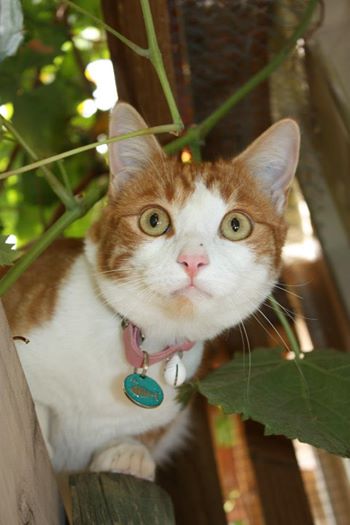

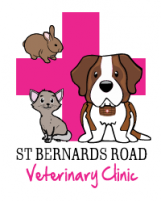
Home | Our Team | Caring for your Pets | Pet Products |
| FAQ | Our Patients | Latest News | Our Services
Site design | That's Graphic
